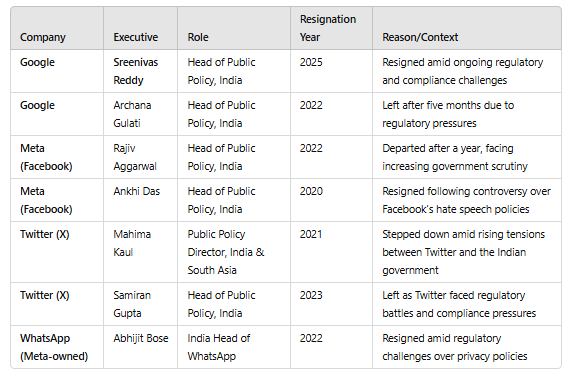Google’s Public Policy Shake-up: Are big techs struggling to retain policy heads in India?
Instability in public policy roles is a recurring issue for a few big tech firms and multinationals in India. Complex regulatory landscape, heavy compliance burden, or lack of leadership? Experts weigh in.
ADVERTISEMENT
Major technology firms and multinationals, including Google, X (Twitter), and Meta, have seen a high turnover in their public policy leadership in the country over the past few years. The recent departure of Google India's public policy head Sreenivasa Reddy, after a short stint of about 16 months, following Archana Gulati's resignation merely five months into the same role in 2022, has ignited the question of whether big tech firms are struggling to retain policy heads in India?
At Meta, Rajiv Aggarwal, Head of Public Policy, left in 2022 after about a year in the position. His predecessor, Ankhi Das, resigned in 2020 following controversy over the platform's policy to handle hate speech in India. At X, Mahima Kaul, Public Policy Director for India and South Asia, resigned in early 2021, citing personal reasons amid increasing tensions between the platform and the government. Soon after, Samiran Gupta, who headed public policy for X in India left in 2023, as the platform faced content moderation-related regulatory battles and compliance issues.
Google's key departures in India also come at a time when the firm is reportedly facing a series of antitrust challenges.
Experts opine that such a frequent reshuffling of a public policy head role could also be because it demands a maestro who can orchestrate complex policy symphonies while keeping pace with the ever-evolving tech landscape — which, so to say, isn't an easy task for a lot of multinationals.
Partly because at times it is the foreign teams at multinationals who are evaluating Indian roles without being aware of the background, says a senior executive at a tech firm who wished not to be named. The executive adds, "It's not necessarily the case that this is a big tech problem, at times this is a company-specific problem. During hiring decisions, there is very little devolution of decision-making that happens from corporate headquarters."
"It can also become exacerbated by internal company culture which may not be a culture in all parts of the company in all parts of the world. It's hard to say whether Google India culture internally is the same in terms of culture is the same as what is in Mountain View..." he remarks.
Case in point, the executive highlights, is that Reddy came from a compliance background to join Google and lead a public policy role, which according to him are two different roles.
Experts suggest big tech firms avoid bringing foreign decision-making into Indian hiring.
There are a little over 240 Public Policy leaders active in the Indian IT space, at present and a little under 40% of these leaders have experience above 10 years. The public policy leadership in India's tech sector has grown by 15% over the last year.
Siddharth Verma, head of Xpheno Executive Search, highlights that the rising need and urgency of big tech and product and service bellwethers to onboard and retain leaders in the public policy space only further amplifies the demand. As highly sensitive and often mission-critical leadership roles, enterprises also ring-fence these leaders as much as they can from competition.
Wearing A Strategic Hat
In general, big MNCs often face a labyrinth of evolving regulations — from data localisation to antitrust scrutiny — that forces policy heads to solve intricate puzzles regularly. Balancing global corporate strategies with local political sensitivities and sudden regulatory shifts makes the job challenging, to say the least.
These challenges are universal for MNCs, however when it comes to India’s policy arena, it certainly needs someone to play on 'Expert Mode'.

The recent departures at tech firms.
India's focus on the tech sector leads to rapidly changing laws, unexpected antitrust probes, and strict data privacy mandates creating a situation where policy leaders must pivot strategies almost daily — like shuffling on shifting sand, shares Siddharth Chandrashekhar, Advocate, Bombay High Court.
With constant pressure from government, media, and public interest groups, policy heads must navigate conflicting demands that can turn every decision into a potential headline and a potential PR nightmare.
The public policy role has in fact emerged as a conscience keeper and not just a support function, according to Vinod Kumar, President, India SME Forum.
The larger or global a company is, the more critical the role of public policy. The function now maps out the top most stringent benchmark and applies to all geographies — which in effect means many countries benefit from the global outlook. The diverse portfolio also creates higher pressures, he adds.
For companies like Google, it is an act of walking the tightrope towards delivering the best for consumers without compromising the ethical compass.
A senior industry advisor points out that Google is in a very unenviable position and it's not an easy solution.
"Whoever is going to come up to handle this portfolio, it's a gigantic task because you need to have a buy-in from not only external stakeholders like policymakers, government regulators, or other industry peers, but an important element is that they need to have internal stakeholders who understand this landscape — which is missing at present," he remarks.
Google is currently fighting antitrust challenges against the practices of its businesses such as Android and Play Store. It is also attempting to deal with antitrust probes from the Competition Commission of India (CCI) for alleged abuse of dominance in its other businesses including news aggregation.
So for a public policy head, it could be a high-wire act without a safety net.
Experts also highlight that not only the policy heads are facing rejigs, but the churn is also happening at junior levels in the same domain.
Given the complex situation, Sandeep Goyal, Chairman, Rediffusion, highlights that India can adopt what markets in the West have been doing. In Western markets, there are specialist government lobbyists and agencies. But in India, lobbying and lobbyists have negative connotations.
"Policy jobs are not easy in India. A lot of former journalists and some bureaucrats opted for these assignments believing they had 'domain knowledge'. But the stress starts when you have tough hearings before the Joint Parliamentary Committee or Competition Commission - those are not easy to face up to," he sumps up.


